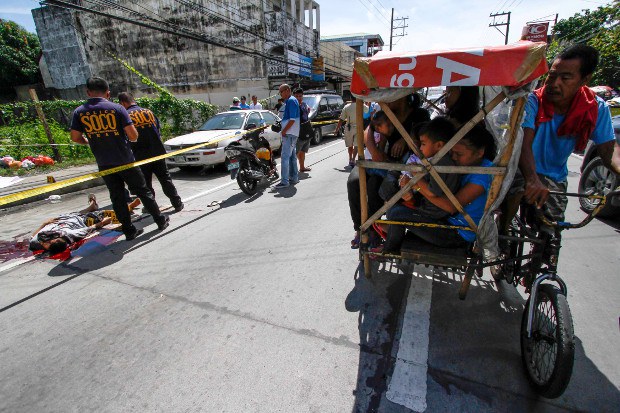Philippines: Drug Lords Accused of Using Rights Groups to Discredit Duterte
2018.03.26
Dagupan City, Philippines
 Children coming home from school in the northern Philippine city of Dagupan glance at a dead suspected drug pusher, one of the thousands of fatalities in President Rodrigo Duterte’s war on drugs, October 2016.
Children coming home from school in the northern Philippine city of Dagupan glance at a dead suspected drug pusher, one of the thousands of fatalities in President Rodrigo Duterte’s war on drugs, October 2016.
Rights groups are being used by unnamed drug lords to destabilize the government, President Rodrigo Duterte’s spokesman said Monday, days after the International Criminal Court said it would push ahead with a preliminary probe into thousands of killings under his anti-drugs war.
Criticisms of Duterte’s government by rights groups “have been vicious and non-stop,” presidential spokesman Harry Roque said.
“We therefore do not discount the possibility that some human rights groups have become unwitting tools of drug lords to hinder the strides made by the administration,” Roque said in a statement.
He said Duterte’s anti-drugs war had led to the disruption of the multibillion-dollar industry, the arrest of “tens of thousands of drug personalities” and the closure of big clandestine drug laboratories.
“To continue to do and thrive in the drug business, these drug lords can easily use their drug money to fund destabilization efforts against the government,” he said.
Brad Adams, Asia director for Human Rights Watch, described Roque’s statement as “shockingly dangerous and shameful.”
“Are they trying to have death squads target human rights activists?” Adams said in a statement emailed to BenarNews.
Roque did not specify the names of drug lords or provide evidence to back his allegations about rights groups. Roque also did not return phone calls from BenarNews.
But Duterte was successful in vilifying a senator, Leila de Lima, the country’s former rights commissioner whom he had accused of protecting detained drug lords by allegedly allowing them to continue their business behind bars in exchange for millions in money that she had supposedly used to fund her successful senate campaign.
De Lima, the most vocal of Duterte’s critics, has been in jail waiting for trial for more than a year. The justice department, however, has dismissed criminal charges against a self-confessed drug lord who had implicated the senator.
‘Psychiatric evaluation’
Roque’s statement came just days after The Hague-based International Criminal Court (ICC) said it would carry on with its preliminary examination into allegations of drug deaths under Duterte’s war on drugs.
After initially welcoming the ICC probe, Duterte suddenly backtracked and claimed that the ICC had already prejudged him. He subsequently notified the body that his government was pulling out of the Rome Statute, an international treaty that created the court.
His aides also said that unnamed Duterte critics had “weaponized” human rights to undermine the government. They have yet to name these critics.
The ICC said it regretted the move, but noted that any withdrawal would only take effect a year a government has notified the United Nations.
Duterte’s government has been antagonistic with international rights groups in recent weeks.
Early this month, the Department of Justice confirmed that it had included U.N. special rapporteur Victoria Tauli-Corpuz on a list of 600 people whom it wanted to categorize as terrorists. In response, U.N. human rights chief Zeid Ra'ad Al Hussein said Duterte needed “to submit himself to some sort of psychiatric evaluation.”
Rights groups say that since Duterte became president in June 2016, more than 12,000 people have died in the war on narcotics, including three teenagers whose deaths last year spurred widespread protests.
Amid the protests, Duterte temporarily pulled the police from the lead role in the drug war, only to reinstate them because, he said, their participation was necessary.
Government figures through February 2018 show that 4,043 people have died in encounters with police under Duterte’s reign, according to a tally by BenarNews. Rights groups have, however, blame thousands of other unaccounted deaths on pro-government vigilantes.
Felipe Villamor contributed to this report from Manila.







